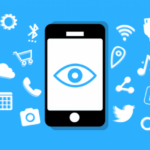In our contemporary, fast-paced digital landscape, smartphones and applications have seamlessly woven into the fabric of our daily existence. Considering these trends, acknowledging the repercussions of extended screen time on our health is imperative.
The constant allure of prolonged social media scrolling and endless gaming sessions poses a significant challenge in finding a balance.
The significance of setting boundaries on app usage reaches beyond self-discipline. It emerges as a vital element in safeguarding both physical and mental well-being.
Physical Health
Prioritizing our physical health in the age of digital dominance is paramount. As screens become omnipresent in our lives, understanding the impact on our bodies is crucial.
Eye Strain and Digital Eye Syndrome
Extended use of screens often results in eye strain and digital eye syndrome, manifesting as discomfort, dryness, and headaches.
As per the American Academy of Ophthalmology, citing The Vision Council, a significant proportion experiences symptoms of digital eye strain. Specifically, 60% of American men and 65% of American women have reported such discomfort.
These statistics underscore the widespread impact of digital eye strain, emphasizing the urgent need for measures to alleviate its effects.
Implementing restrictions on app usage emerges as a practical approach to reducing eye strain. It provides individuals with the opportunity for essential eye rest, potentially curbing the development of long-term vision issues.
Poor Posture
Traditionally, low back pain has been associated more with older adults. However, there is a growing concern about the escalating prevalence of back pain in children and teenagers, primarily linked to the widespread use of screens.
Erika Barger, a physical therapist at UCHealth SportsMed Pediatric Therapy Clinic in Steamboat Springs, highlights a concerning trend. She notes that American children aged 8 to 12, on average, spend four to six hours daily engrossed with screens. This prolonged screen time often involves adopting a slouched position and looking downward.
This posture, often referred to as ‘text neck’ or ‘tech neck,’ imposes extra stress on neck and back muscles, ligaments, and joints. The strain is particularly notable during extended periods of awkward sitting.
Even maintaining good posture while sitting imposes 40% more compressive force on spinal discs than standing, hindering the flow of essential nutrients and fluids.
To address these concerns, encouraging app time limits becomes crucial, as well as promoting breaks and stretches and healthier sitting postures to prevent musculoskeletal issues.
Sleep Disruption
The blue light emitted from screens disrupts the natural production of melatonin, a crucial hormone regulating sleep. A study conducted by Springer Link revealed compelling insights into the connection between smartphone usage before bedtime and sleep quality.
The research demonstrated a notable difference, with 64.2% of bedtime smartphone users experiencing poor sleep quality compared to 31.7% of non-users.
Additionally, smartphone users at bedtime reported a significantly higher prevalence of increased sleep latency and difficulties in maintaining a continuous sleep pattern.
Recognizing that inadequate sleep sets the stage for a challenging day, it becomes crucial to prioritize healthy sleep habits. Minimizing screen time before bedtime is essential in fostering a conducive environment for restful and rejuvenating sleep.
Mental Well-being
As our online lives seamlessly intertwine with reality, grasping the profound effects on mental health becomes essential.
Increased Stress Levels
The constant flow of social media updates, notifications, and information overload is recognized as a major factor in heightened stress levels. This escalation significantly increases the risk of mental health problems.
The impact of social media, particularly Facebook, on mental well-being is underscored by research findings. MIT Sloan reports a 7% increase in severe depression and a 20% rise in anxiety disorders linked to widespread Facebook use.
The repercussions extend to vulnerable populations, with a higher percentage seeking treatment through psychotherapy or antidepressants.
TorHoerman Law has raised allegations against Meta, asserting intentional design for platform addiction, intensifying existing concerns. The disclosure of internal documents by whistleblower Frances Haugen has unveiled troubling facts surrounding the deliberate strategies employed by Meta.
These revelations specifically underscore the harmful impact of Facebook and Instagram on teenagers’ mental health. The issues encompassed include concerns related to depression and body image.
Consequently, these distressing findings have prompted legal action. Notably, the Facebook lawsuit stands as a prominent example, as individuals seek accountability for the alleged adverse impact on mental well-being.
Digital Addiction: Effect on Focus and Productivity
Becoming overly attached to our digital devices is a common problem in today’s world and a clear sign of addiction. This issue doesn’t just impact our relationships; it also makes it harder to concentrate and be creative.
The pandemic has increased our reliance on devices, with around 210 million people globally grappling with social media addiction, according to Forbes.
Social media apps like Snapchat, TikTok, Facebook, and Instagram are made to be addictive, with features like “Like” buttons and comments keeping us hooked. The constant scrolling on these platforms ensures there’s no endpoint to the information and ads we consume.
These features are no accident. They aim to keep us on our devices, even if it harms our mental and emotional well-being. This kind of addiction has a real impact on our ability to focus and be productive, raising concerns about its effect on our daily lives.
In conclusion, recognizing the importance of limiting app usage is essential for maintaining a balanced and healthy lifestyle. Physical health, mental well-being, and social connections all stand to benefit from setting boundaries on screen time.
As we navigate the digital landscape, finding a harmonious relationship with technology becomes crucial. It is key to preserving our overall health and enjoying the numerous benefits of the digital age without sacrificing our well-being.




